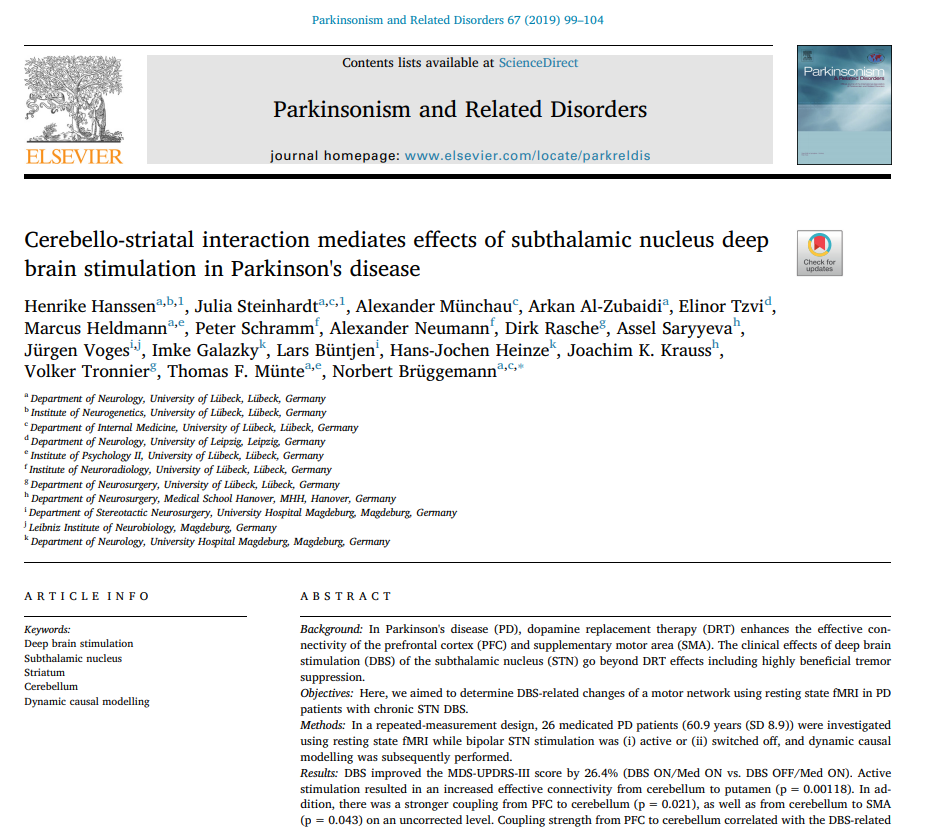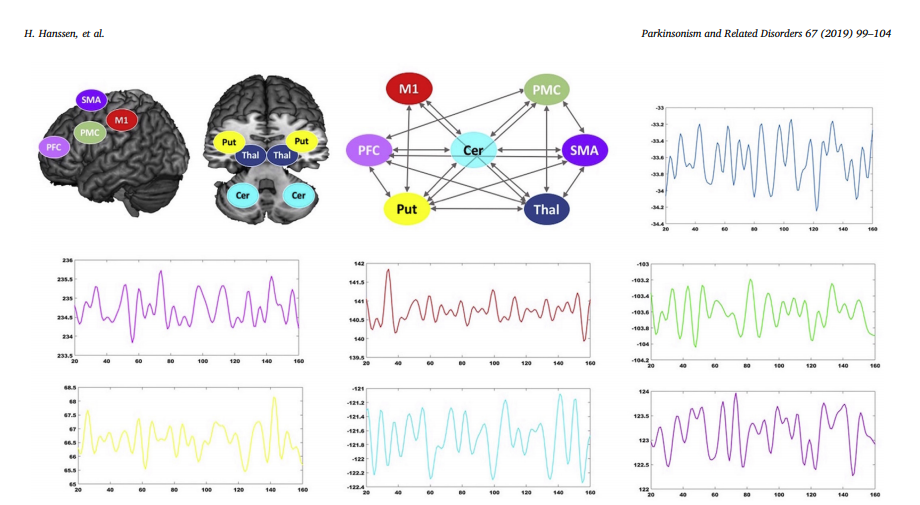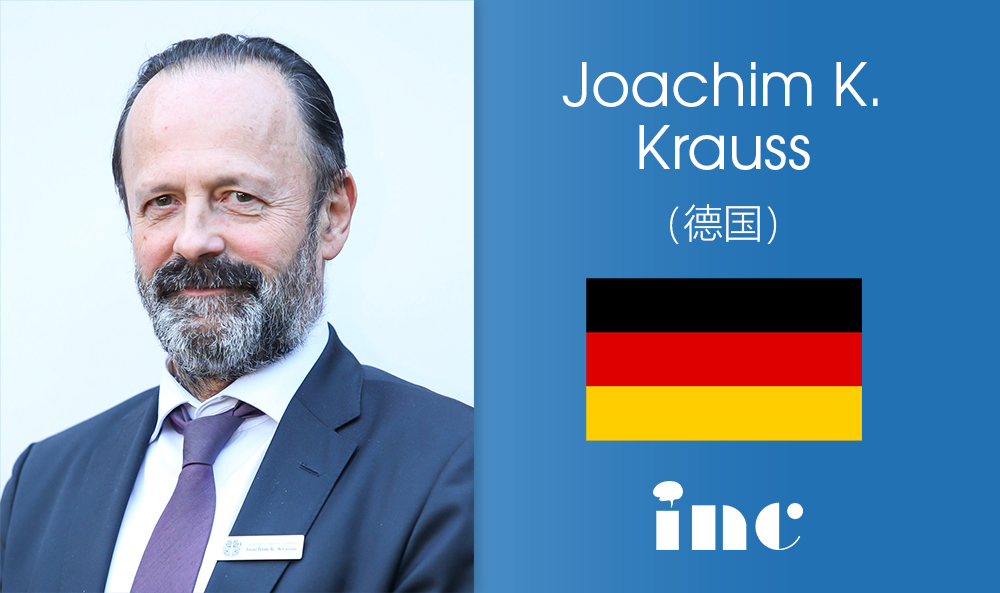Abstract
Background:In Parkinson's disease (PD), dopamine replacement therapy (DRT) enhances the effective connectivity of the prefrontal cortex (PFC) and supplementary motor area (SMA). The clinical effects of deep brain stimulation (DBS) of the subthalamic nucleus (STN) go beyond DRT effects including highly beneficial tremor suppression.
Objectives:Here, we aimed to determine DBS-related changes of a motor network using resting state fMRI in PD patients with chronic STN DBS.
Methods:In a repeated-measurement design, 26 medicated PD patients (60.9 years (SD 8.9)) were investigated using resting state fMRI while bipolar STN stimulation was (i) active or (ii) switched off, and dynamic causal modelling was subsequently performed.
Results:DBS improved the MDS-UPDRS-III score by 26.4% (DBS ON/Med ON vs. DBS OFF/Med ON). Active stimulation resulted in an increased effective connectivity from cerebellum to putamen (p = 0.00118). In addition, there was a stronger coupling from PFC to cerebellum (p = 0.021), as well as from cerebellum to SMA (p = 0.043) on an uncorrected level. Coupling strength from PFC to cerebellum correlated with the DBS-related change of the resting tremor subscore (r = 0.54, p = 0.031). Self-connections increased as a function of DBS in the right PFC, PMC, SMA, M1, thalamus and left cerebellum.
Conclusions:DBS-related improvement of Parkinsonian signs appears to be driven by an interaction between the cerebellum and the putamen. Resting tremor suppression may be related to an enhanced prefronto-cerebellar network. Activation of the mesial premotor loop (PFC-SMA) as seen in DRT may thus be secondary due to the primary modulation of cerebellar networks.

背景:在帕金森病(PD)中,多巴胺替代疗法(DRT)增强了前额叶皮质(PFC)和辅助运动区(SMA)的合适连接。丘脑底核(STN)脑深部刺激(DBS)的临床效果超过DRT效应,包括高度有益的震颤控制。
目的:在这里,我们的目的是用静息状态功能磁共振成像(fMRI)来确定慢性STN-DBS帕金森病患者与DBS相关的运动网络变化。
方法:采用重复测量设计,对26例60.9岁(SD 8.9)的PD患者进行静息状态功能磁共振成像(fMRI)研究,并在双较STN刺激(i)激活或(ii)关闭的情况下进行动态因果建模。

结果:DBS使MDS-UPDRS-III评分提高了26.4%(DBS ON/Med ON vs DBS OFF/Med ON)。主动刺激可增加小脑至壳核的合适连通性(p=0.00118)。此外,在未校正的水平上,PFC与小脑(p=0.021)以及从小脑到SMA(p=0.043)的耦合更强。PFC与小脑的耦合强度与静息震颤亚重要DBS相关变化相关(r=0.54,p=0.031)。在右侧PFC、PMC、SMA、M1、丘脑和左小脑,自我联系随着DBS的增加而增加。
结论:DBS相关帕金森病体征的好转似乎是由小脑和壳核之间的相互作用驱动的。静息震颤控制可能与增强的前额叶-小脑连接有关。因此,由于小脑网络的初级调节,DRT中的内侧前运动环(PFC-SMA)的激活可能是继发性的。
关于德国Joachim K. Krauss教授

1.国际立体定向与功能神经外科学会主席
2.欧洲立体定向与功能神经外科学会前主席、现任荣誉主席
3.国际神经外科联合会(WFNS)立体定向与功能神经外科委员会主席
4.德国神经外科学院现任院长
5.德国神经外科学会技术标准委员会主席
6.运动障碍学会神经外科协会负责人
在国际功能神经外科领域,有这样一位的领军人物——国际神经外科联合会(WFNS)立体定向与功能神经外科委员会主席、国际立体定向与功能神经外科学会主席德国Joachim K. Krauss教授。他目前也是INC国际神经外科顾问团的成员教授。
30多年丰富而的功能神经外科疾病咨询经验成就了Krauss教授这样一位国际功能神经外科教授,他擅长包括神经肿瘤学、小儿神经外科、血管神经外科、颅底神经外科、脊柱外科、脊柱外科、立体定向与功能神经外科、创伤神经外科、疼痛神经外科、脑积水外科等,涵盖面较为广泛,堪称一代国际功能神经外科教授。
除了Krauss教授,INC这个由国际各发达国家神经外科宗师联合组成的教授集团还有十多位来自欧洲、美国、日本等发达国家的国际神经外科巨擘,他们大多都是国际神经外科联合会(WFNS)及各种国际神经外科学术组织的成员,国际神经外科各大杂志主编,以及神经外科教科书中以其本人名字命名手术方式和解剖结构的教科书级神外专家。
原文链接:<https://www.sci-hub.pl/10.1016/j.parkreldis.2019.09.003>




